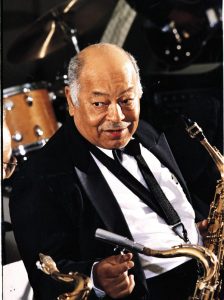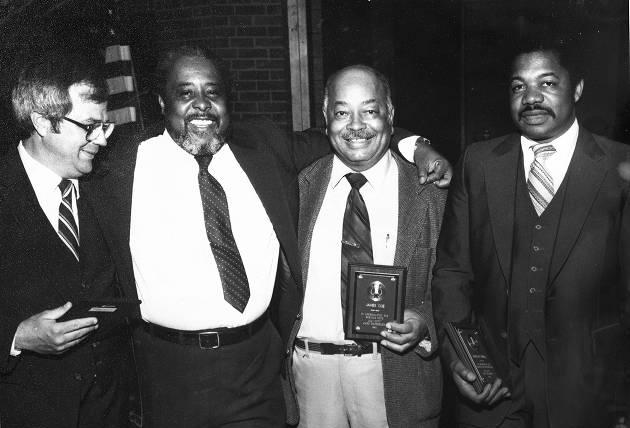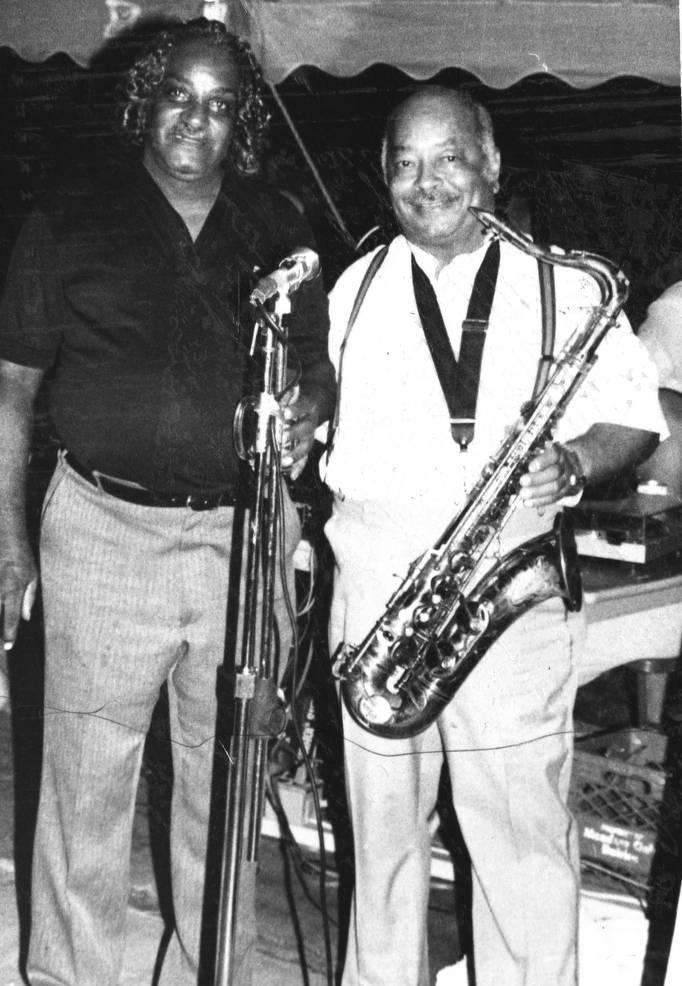
Photo info ...
Credit: IndyStarView Source
(Mar. 20, 1921-Feb. 26, 2004). James R. Coe was born James R. West in Tompkinsville, Kentucky. William McKinley Coe adopted West upon marrying Coe’s mother Mary Lee Wilburn. The family moved to Indianapolis when Coe was two years old, which is where Coe grew up, attended , and started his musical career. Coe played several instruments but is most remembered for his performances on the saxophone.
Coe’s cousin Lottie Williams was an early influence introducing him to varied genres of music and instrumentation. He first played a three-quarter size violin and later a pump-style piano.
As a sophomore at Attucks, Coe taught himself to play clarinet and formed his first band. After seven months of clarinet playing, he transitioned to the saxophone and began writing and arranging music.
In 1938, Coe began his career performing at the Cotton Club, owned by the , and later the Mitchell Inn, both along . He left Indianapolis in 1941 to perform and record with Jay McShann’s band as a replacement for Charlie Parker.
When Coe performed with Tiny Bradshaw’s group in late 1942, he was instrumental in promoting the transition from the two alto-two tenor sax section that most bands used to a five-man sax section with a full-time baritonist.

While in the U.S. Army during World War II, Coe organized a band when first stationed at Fort Custer, Michigan. Later, in the Pacific Theater, he performed with the 415th band while stationed in New Guinea and the Philippines. At war’s finish, Coe returned to Indianapolis finding work at the Ritz where he first met .
In the late 1940s, Coe formally studied clarinet at and performed at the Cotton Club in Cincinnati, Ohio from 1950 to 1953. He recorded on the King Records label as Jimmy Cole and his Orchestra, in the label’s attempt to capitalize on the success of jazz singer Nat King Cole.

A contract with States Records in Chicago using the name Jimmie Coe and The Gay Cats of Rhythm resulted in two hit records. The after-hours session performed above George’s Bar at the Royal Roost on Indiana Avenue served as inspiration for Coe’s hits, “The After Hours Joint” and “Honkers and Bar Walkers,” both recorded at State Records in 1953 but released in the 1980s by Delmark Records.
A versatile musician, Coe signed with Note Records of Indianapolis in the late 1950s and collaborated with white rock and roll musician Ronnie Haig. With his band, now called the Five Stars which included fellow saxophonist and Wes Montgomery, Coe’s ensemble benefited from the successful relationship with an appearance on Dick Clark’s American Bandstand giving them widespread exposure.
Coe toured less by the 1960s, playing organ and piano with the house band at the Pink Poodle, on Capitol Avenue in Indianapolis. He also began teaching music in and became its Jazz Artist in Residence in 1984. Always keyed into changes in jazz and R & B music, Coe joined a 17-piece big band in 1965 that backed legendary artists Aretha Franklin and Gladys Knight & the Pips. For a brief time, Coe helmed his own indie label called Intro, producing a soul-jazz single.
Recording and performing less often for the next few decades, Coe worked as a buyer in the Central Purchases department of the City of Indianapolis from 1972 to 1982. In 1972, Duke Ellington presented him with a lifetime achievement award in jazz on behalf of Indiana musicians. In 1994, Time Records released a recording that featured two tracks from a live concert at the featuring Coe, Pharez Whitted, and the Indianapolis Symphony Orchestra, as well as big-band tracks spotlighting Coe’s arranging and lead alto saxophone playing.
In 1998, Coe was in the first group of musicians inducted into the Indianapolis Jazz Foundation Hall of Fame. Recording in 2000 and 2002 with Naptown Jazz Records provided Coe the opportunity to promote older forms of jazz and R&B music. His last live performance was a three-night gig in Zurich, Switzerland, in 2002. In 2004, one month before his death, Coe received a special tribute from the International Association for Jazz Education during its annual convention in New York City.
Coe left a legacy of adapting to numerous genres of music while performing and recording with musical titans and as a solo artist. His contributions to music left an indelible imprint that influenced many of his contemporaries as well as future generations of musicians.

Help improve this entry
Contribute information, offer corrections, suggest images.
You can also recommend new entries related to this topic.